Ann Martin - Baby-Sitters Club 032
Здесь есть возможность читать онлайн «Ann Martin - Baby-Sitters Club 032» весь текст электронной книги совершенно бесплатно (целиком полную версию без сокращений). В некоторых случаях можно слушать аудио, скачать через торрент в формате fb2 и присутствует краткое содержание. Жанр: Старинная литература, на английском языке. Описание произведения, (предисловие) а так же отзывы посетителей доступны на портале библиотеки ЛибКат.
- Название:Baby-Sitters Club 032
- Автор:
- Жанр:
- Год:неизвестен
- ISBN:нет данных
- Рейтинг книги:4 / 5. Голосов: 1
-
Избранное:Добавить в избранное
- Отзывы:
-
Ваша оценка:
- 80
- 1
- 2
- 3
- 4
- 5
Baby-Sitters Club 032: краткое содержание, описание и аннотация
Предлагаем к чтению аннотацию, описание, краткое содержание или предисловие (зависит от того, что написал сам автор книги «Baby-Sitters Club 032»). Если вы не нашли необходимую информацию о книге — напишите в комментариях, мы постараемся отыскать её.
Baby-Sitters Club 032 — читать онлайн бесплатно полную книгу (весь текст) целиком
Ниже представлен текст книги, разбитый по страницам. Система сохранения места последней прочитанной страницы, позволяет с удобством читать онлайн бесплатно книгу «Baby-Sitters Club 032», без необходимости каждый раз заново искать на чём Вы остановились. Поставьте закладку, и сможете в любой момент перейти на страницу, на которой закончили чтение.
Интервал:
Закладка:
"Well, this is good news," I told my friends. "I can't believe we scheduled this so easily. Mary Anne, pencil me in for Susan for the next month, and I'll call Mrs. Felder back." I dialed the Felders' number. "Hi," I said. "This is Kristy Thomas again, president of the Baby-sitters Club. I'm happy to tell you that I will be Susan's sitter for the next month. We worked out all the details." Mrs. Felder didn't sound as happy as I'd expected. In fact, all she said was, "That's fine. But I think you better meet Susan before you make a final decision about the job, okay?" "Okay," I replied uncertainly.
We decided that I would go to the Felders' on Friday before the next BSC meeting. What kind of child was Susan? I wondered. Why did Mrs. Felder think I might not want to sit for her? I was dying of curiosity.
Chapter 4.
Not far from Susan Felder lives a family, the Braddocks, with a deaf boy named Matt. Jessi once had a long-term sitting job for Matt and his sister, Haley - just like the one I was about to begin (maybe) with Susan. I remember Jessi saying how nervous she was the first time she rang the Braddocks' doorbell. What would Matt be like? she'd wondered. She knew he communicated using sign language. Would Jessi be able to learn enough sign language to talk with him? Would he be difficult to sit for? How would he react to a stranger?
Now I knew how Jessi had felt. Charlie had just dropped me off at the Felders', calling out the car window that he would pick me up after the BSC meeting. He had driven away, and now I was standing on the Felders' front stoop, my finger poised to ring the bell.
What would Susan be like? All I knew of her was what I had seen when she'd been out walking - a reluctant-looking little girl who made strange gestures and movements. And I knew she'd gone to a "special" school. But what kind of school exactly? Mrs. Felder had hinted that I might not want the job once I met Susan.
I had looked up "autistic" in the dictionary. I couldn't find the word, but I had found "autism." The definition said something about childhood schizophrenia, acting out, and withdrawal. That was no help. Then I looked up "schizophrenia," but I was more confused than ever. The definition mentioned "withdrawing from reality." For heaven's sake, I am always withdrawing from reality - every time I daydream. And my stepsister, Karen, believes in ghosts and witches, but there's nothing wrong with her. I would have to wait and see what Mrs. Felder said.
I rang the doorbell.
I could hear a piano playing. It stopped when the bell rang. A few moments later, Mrs. Felder was at the door.
"Kristy?" she said.
"Yes," I replied. "Hi, Mrs. Felder." "Goodness, you've grown," was her reply, as she held the door open for me.
"Really?" I said. "Thanks. I'm still the shortest person in my class, though." "I guess I haven't seen you in awhile. I knew your family better when David Michael was little. Your mom and I tried to set up play dates for him and Susan, but Susan was already . . . different. Even then. She's eight now. How old is David Michael? He must be almost eight." "Yup. He's seven and a half," I replied.
Mrs. Felder nodded. She had led me into the living room, which was bright and sunny. A grand piano filled almost a quarter of the room. And walking restlessly back and forth in front of it was the little girl I had seen out Claudia's window.
Susan.
She was wringing her hands in front of her and making clicking noises with her mouth. She didn't look at either her mother or me.
"Susan?" said Mrs. Felder. "Susan? . . . Susan!" Susan continued walking and flapping and clicking.
"Susan!" said Mrs. Felder more loudly. "Come here, please." Like a sleeper waking from a dream, Susan turned and walked toward us. Her eyes were fixed on some point above our heads.
"Susan, this is Kristy," said Mrs. Felder.
"Hi," I said, getting my first close-up look at Susan Felder. And I saw that she was beautiful. Her .eyes were wide and deep brown, and her hair, which was almost as dark as Claudia's, fell in soft curls to her shoulders. She could be a model, I thought.
Since Susan hadn't answered me, I said, "Hi," again.
Susan, still staring into outer space, wrung her hands a few times. Then she turned and flapped her way back to the piano.
I looked at Susan's mother. My eyes must have been question marks.
"She doesn't speak," said Mrs. Felder. "She could, but she doesn't. She can sing, though. Come on. Let's sit on the couch and I'll tell you about Susan." I almost said, "In front of her?" but I realized that Susan probably would not be listening.
Mrs. Felder and I sat down, and I said, "I looked up autism in the dictionary, but I didn't understand the definition." Mrs. Felder smiled. "I'm not surprised. There's a lot more to autism than anyone could fit into a dictionary definition. The best way I can describe it to you - and the symptoms vary from person to person - is that Susan is in her own world, and she doesn't seem to want to leave it. She doesn't communicate with anyone, she exhibits the strange behavior you see now - wringing her hands, clicking her tongue - and she rarely makes eye contact with anyone. Also, she doesn't much like to be touched or hugged, even by her father and me." "What caused it?" I whispered, awed.
Mrs. Felder shook her head. "No one is certain. What we do know is that autistic symptoms always show up by the time a child is three - usually earlier, that most autistic people are boys, and that the syndrome is rare." "Will Susan get better?" I asked.
"Maybe. Some educators and doctors believe that if an autistic child starts acquiring meaningful language by the time he's five, he can become much better. That hasn't happened for Susan. She can sing, but she has no meaningful language. Even those children who do acquire some speech will probably never be what most people consider 'normal.' They might be able to live in a group home, work part-time at a job or in a sheltered workshop - but that's about it." I just nodded. I understood what Mrs. Felder wasn't saying: Susan's future looked bleak.
Just when I was beginning to feel terribly sad, though, Mrs. Felder spoke again. "We're somewhat encouraged, her father and I," she said almost proudly, "because Susan is autistic but she's also a savant. That means she has some very specialized talents." "Really?" I asked, intrigued.
"Yes. Although Susan is untestable, her IQ is thought to be below fifty, which is extremely retarded. But you should hear her play the piano." Mrs. Felder smiled. And I began to feel hopeful instead of sad. "She's really remarkable," Mrs. Felder went on. "She astonishes everyone - her teachers, her doctors, even music teachers. She can usually play any new piece of music after hearing it only once. Just like that - she's got the whole thing memorized and she can play it. She can play long, long scores, and any type of music - classical, ballads, show tunes, you name it. She can even play something she's only heard played on another instrument, such as the violin." "How does she do that?" I asked. I was amazed.
"Nobody is sure. I do play the piano myself, and when Susan was little I used to entertain her by sitting her next to me and teaching her simple songs. But then she just took off. Believe me, I can't do what Susan does.
"Oh," Mrs. Felder continued, "if a piece of music has words to it - in any language - Susan can also memorize the song after hearing it once, and sing it while she plays. She has perfect pitch. We don't think the words mean anything to her, they're just more things to memorize, but singing and playing the piano seem to make her happy. She'd play all day if we let her. In fact, her musical abilities are the reason she's between schools right now. We're in the process of transferring her to a school with a strong music program. Ifs about an hour outside of Stoneybrook. The teachers and Mr. Felder and I are hoping that, through music, Susan can acquire some meaningful language as well as some social skills. We feel this is the best way to reach her. Of course, we want her to study music for its own sake, too.
Читать дальшеИнтервал:
Закладка:
Похожие книги на «Baby-Sitters Club 032»
Представляем Вашему вниманию похожие книги на «Baby-Sitters Club 032» списком для выбора. Мы отобрали схожую по названию и смыслу литературу в надежде предоставить читателям больше вариантов отыскать новые, интересные, ещё непрочитанные произведения.
Обсуждение, отзывы о книге «Baby-Sitters Club 032» и просто собственные мнения читателей. Оставьте ваши комментарии, напишите, что Вы думаете о произведении, его смысле или главных героях. Укажите что конкретно понравилось, а что нет, и почему Вы так считаете.







